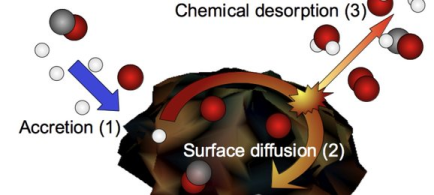Experimental evidence for major impact of micron-sized dust particles in the universe
A French/Dutch team of astronomers, including Stéphanie Cazaux from the Kapteyn Institute, University of Groningen, has proved via laboratory tests that molecules in microscopically small dust particles in space can be directly transformed into gas. These findings may have important consequences for theories on the chemical structure of the universe and the way stars are formed. The findings were published online in Nature Scientific Reports on February 26th.

Article: Dulieu, F. et al. How micron-sized dust particles determine the chemistry of our Universe. Sci. Rep. 3, 1338
http://www.nature.com/srep/2013/130226/srep01338/full/srep01338.html DOI:10.1038/srep01338 (2013)
More information:
Contact: Stephanie Cazaux, University of Groningen Kapteyn Institute
E-mail:
cazaux astro.rug.nl
| Last modified: | 01 February 2017 12.45 a.m. |
More news
-
29 April 2024
Tactile sensors
Every two weeks, UG Makers puts the spotlight on a researcher who has created something tangible, ranging from homemade measuring equipment for academic research to small or larger products that can change our daily lives. That is how UG...
-
29 April 2024
Behind the scenes: how UG and Hanze UAS students are jointly developing a Mars rover
This year the students of the Makercie team are participating in the physical edition of the European Rover Challenge in Poland. Read more about the team and the collaboration between the RUG and Hanze UAS here.
-
23 April 2024
Nine MSCA Doctoral Network grants for FSE researchers
Nine researchers of the Faculty of Science and Engineering have received a Horizon Europe Marie Sklodowska Curie Doctoral Network grant.
